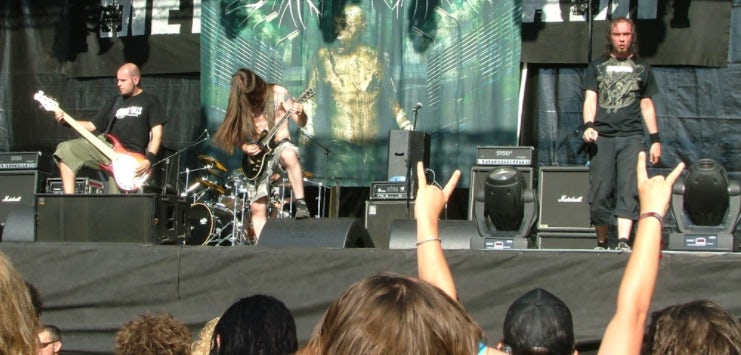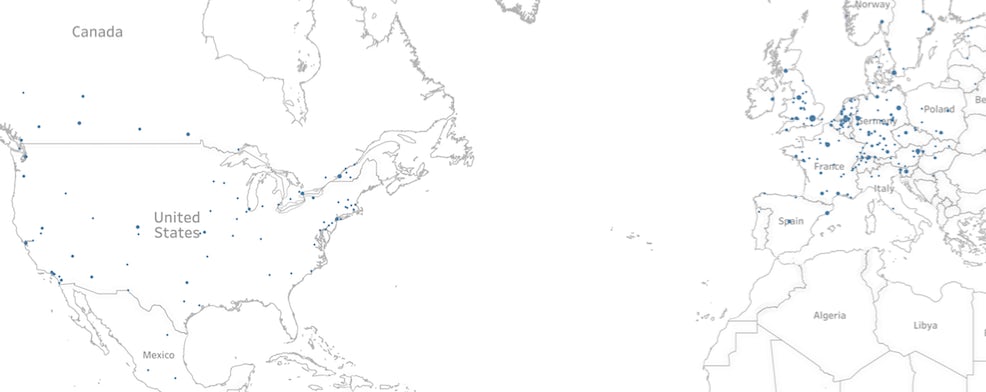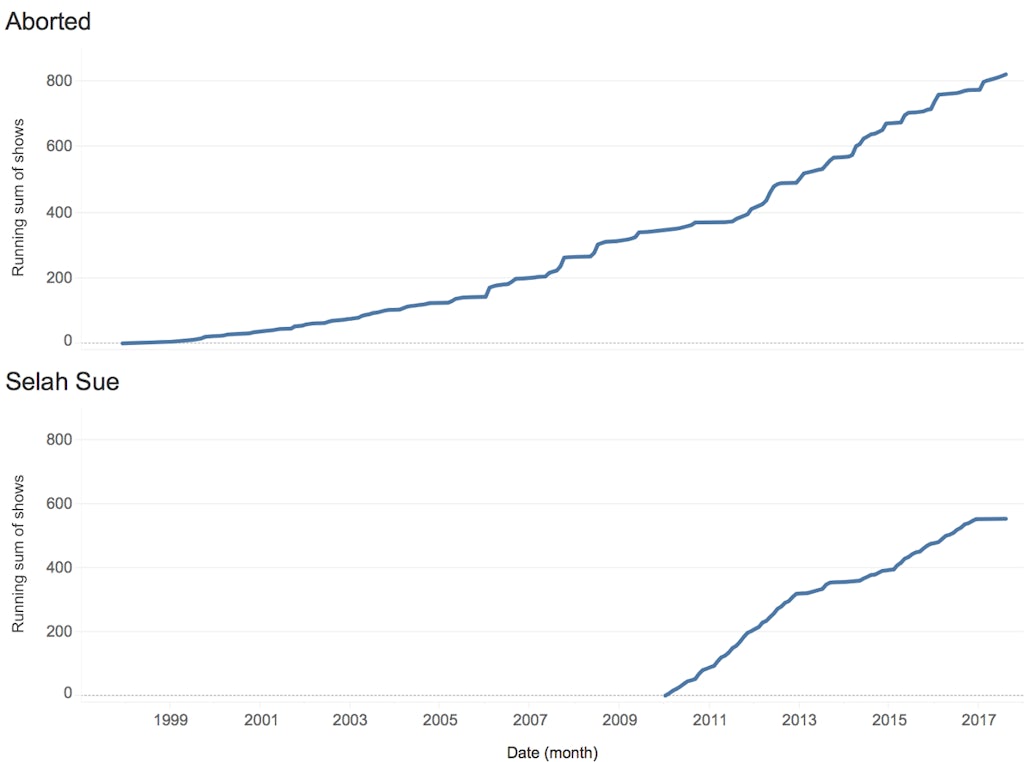
Bored in the USA
Belgian bands touring internationally
We’ve been collecting data on the international tours by music acts from Flanders and Brussels for a while now. As patterns are starting to rise up from the figures, we’ll do our best to keep you up to date on our findings and interesting insights.
One of the three main organisational pillars at the Flanders Arts Institute is supporting the development of a sustainable international career for Flemish artists. Both in (audio)visual arts and in performing arts, creators have a fairly open international scope. And that same “international gaze” could be attributed to Flemish musicians. However, much like it is customary to be oriented towards western cultures — or Anglo-European bastions embedded in non-western countries — within the visual arts canon, aspiring Flemish musicians often treasure the ambition of making it in the US or the UK.
As I wrote in a blog post last year — apart from our neighbouring countries France, Germany and The Netherlands — the United Kingdom and North America complete the top five of countries that book Flemish music acts. Interestingly so, an analysis by my colleague Simon Leenknegt, has shown that the United States (1) and the UK (2) are the countries most referred to by pop & rock musicians in their band bio’s or press kits. (By the way, we’re defining pop & rock music in the broadest sense of the word possible, ranging from minimal electronic acts to death metal bands, and everything in between.)
Less is more
Today, I would like to go one step further. And while we continue to collect all possible data on music acts from Flanders or Brussels touring internationally, we’re starting to spot some underlying trends.
So let me give you a very short introduction on what data we’re looking at, before we dive in. For starters, Tom Ruette, our head of data at Flanders Arts Institute, has scraped all international tour data for Belgian acts from Songkick and BandsInTown and mixed them into a delicious music export cocktail. In total we found 11.624 international concerts by Belgian musicians (no distinction to be made between acts from Flanders, Brussels or Wallonia).
Secondly, we had been systematically collecting data in the Arts Flanders database, covering over 4.000 international concerts between 2013 and 2014. And we’re constantly updating our data with additional tour dates. So, if you’re a band or manager and want us to include your tour in our research: send over your international tour dates to nico[at]kunsten.be.
Thirdly, Valerie Ansoms, who did an internship at Flanders Arts Institute over the past couple of months, wrote her master thesis at the University of Antwerp on what it means for Flemish musicians to “break through” internationally. Turns out there are a lot of different components to and definitions of an international breakthrough, depending on from what perspective you’re looking at it. Her paper will appear online over the course of the next couple of months.
¿Por qué no?
Maybe just a quick word on why we’re doing all this? Obviously, it’s not just about boasting how much Flemish acts are playing abroad. ‘Playing more’ doesn’t necessarily entail playing better (or even larger) venues anyway. One reason for this research is to find out which countries offer interesting opportunities, what venues are keen on booking Belgian bands and what type of international trajectories are best suited for a specific type of acts.
Another reason is to offer musicians and their entourage a clear image of what’s really going on abroad. Is band X’s US tour really as impressive as the media made it out to be? Should you consider refusing an attractive offer in Russia if it’s just a “one off” — meaning just a gig without the necessary invitations (a local agent or label with concrete interest for example) or follow-up shows in nearby cities? And last but not least: a transparent mapping of our international concerts can help managers to plan (financially) viable tours and get in touch with colleagues to ask for advice or share expertise. In the end, wouldn’t we all be better off?
And finally, if we can succeed in mapping the international trajectories of Flemish music acts, it can help policy makers understand their specific needs, and thus adjust their future record of decisions accordingly.
Underground vs mainstrem
First off, we’ll provide a general overview of Belgian acts that performed most shows between 2013 and 2016, based on the data scraped from Songkick and BandsInTown. The ones that performed most international shows — according to our provisional, yet extensive dataset — are Netsky, Aborted, Balthazar, Stromae, Selah Sue, Aeroplane, Triggerfinger, Arno, Evil Invaders, Kill Frenzy, Trixie Whitley, Puggy and Oscar & The Wolf.
Although — obviously — there are some popular artists to be found on the top of the list, this is far from a ranking of international success. Instead, what this list tells us is merely how many international performances each act has performed, which is nevertheless very interesting on its own. Also, the enumeration paints quite a promising picture with regards to diversity: metal bands are to be found alongside mainstream pop and electronic acts.
But let’s delve a little deeper into the data.
Cultural sociologist Gert Keunen acknowledges three different kinds of pop & rock styles: mainstream pop, underground music, and what he calls ‘alternative mainstream’, referring to music that respects underground values but at the same time isn’t opposed to being commercialised. It’s definitely not the only classification one could make, and perhaps not even the most all-embracing. But it is a very useful one, especially given the specific names in our list.
In line with Keunen’s theoretical framework, we could arguably call Selah Sue — who’s signed to Because Music (Justin Bieber, Major Lazor, Justice, Manu Chao) — ‘mainstream pop’, while labelling Aborted as an ‘underground’ band. We thought it might be interesting to compare these two cases: see if there are obvious discrepancies in number, size and type of shows performed in different countries around the globe.

Between 2010 and (including) 2016 we distinguish 432 Aborted concerts, spread across 40 different countries and 289 cities. Selah Sue has performed 555 times in 276 towns in 34 countries. Let’s zoom in on Selah Sue’s shows in detail. To keep the image somewhat accessible, we focus on Europe and North America, as they entail the vast majority of the concerts.

Clearly, Selah Sue has performed far more in Belgium and France than in any other region. Although this might seem instinctively logical, the contrast in range of geographical distribution with Spain, England, Italy, Switzerland and even Germany is quite remarkable. Another noteworthy observation is the focus on New York, when playing in the States. While performing 15 times in the Big Apple, she made it to San Francisco just 2 times for example.
The situation for Aborted looks quite a bit different. For starters: whereas Selah Sue visited 27 different towns, performing 64 times, they toured across 58 American cities, playing 77 gigs. The same pattern arises, however, when we look at the general picture. Even though Selah Sue performed 123 shows more than Aborted, you had the chance to see the metal band in 289 cities (as opposed to 276) and 40 countries (6 more than Selah Sue). The shows Aborted played are thus more evenly spread geographically, even though the focus countries remain more or less the same.

It’s important to note, however, that while the international trajectory of both acts remains remarkably similar between 2010 and 2016, how they got there in the first place is completely different. While Aborted (formed in 1995) had been building up their live reputation for years, Selah Sue’s first single ‘Crazy Vibes’ just broke through in 2009, rapidly launching her onto the biggest stages in Belgium and abroad. This becomes clear when we look at the so-called ‘running sum’ of shows over time, shown below:

Similarly, whereas founder and frontman Sven de Caluwe also functions as both (tour) manager and booking agent for Aborted, Sanne is surrounded by a management team (Gentlemanagement), a booking agent (Busker Bookings), a big international record label (Because Music), and a backing band.
Moving forward
These data might not be 100% exhaustive. They are considerably extensive. And at the very least it is remarkable to observe the similarities (focus countries, number of shows) and the differences (steady vs. fast growth, high vs. low concentration within focus countries) between an underground metal band and a mainstream pop act respectively.

Although it we should avoid drawing premature conclusions, at the very least this case study has been a valuable exercise, providing useful insights and a possible blueprint for the analysis of the huge amounts of data we continue to collect at Flanders Arts Institute.
So where do we go from here?
We will keep collecting new data and expanding our current database, in order to be able to provide the most complete picture possible. Furthermore, my colleague Joris Janssens is building upon the series of in-depth interviews Valerie Ansoms conducted, adding a more qualitative approach to our quantitative data analysis. We will point out and analyze some of the difficulties Flemish musicians run into when touring abroad. Also, we will zoom in on some more case studies. Finally, we will conduct interviews and focus groups with the management, agents and labels surrounding the cases we’ll examine.
If you have any additional information you would like to contribute to our research, or any input whatsoever: feel free to drop a comment or get in touch with me directly.
See you soon for another update on where we are in our international research.





